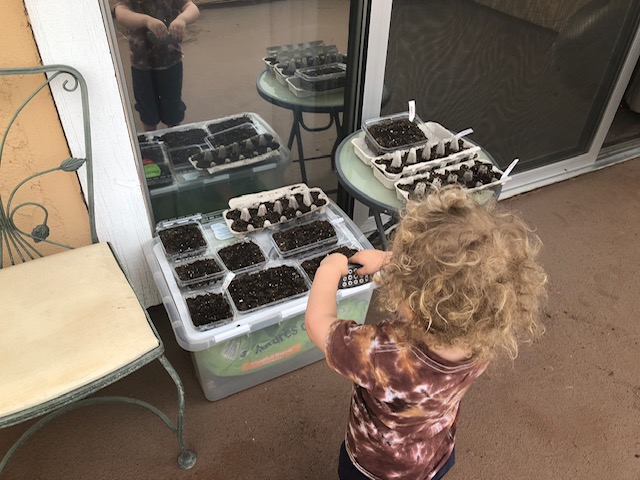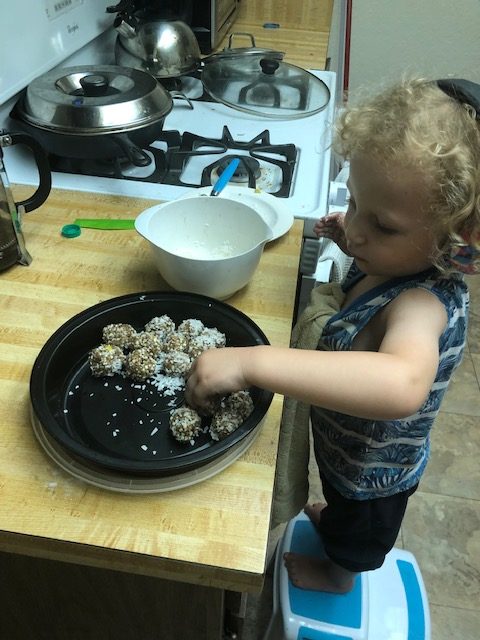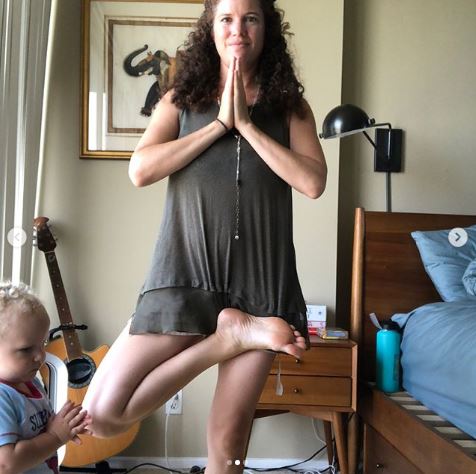
Relephant Read: Here’s how we get through This. {Updated} ~ Waylon
~
Let’s face it…we all needed a rest.
Just like when our individual bodies get sick and tired, giving us the message that we need to take a pause, our collective body is really giving us the message now to slow down and pay attention. We need to breathe more and appreciate that breath, because it might not be so easy tomorrow. We need to be more aware of what we have, what we use, and how we do things.
We are all becoming acutely aware of how interconnected we are. Suddenly, there’s this understanding that if we are opening a door in a public place (thank goodness there are automatic doors at the grocery store) then many other people have also touched that knob.
The truth is, our actions have always affected one another, we just need an occasional wake-up call to remind us how much.
Those of us with small children are also being forced to reckon with how hard it is to teach them basic hygiene—they touch everything and then immediately stick their fingers in their mouths and noses. They like to lick windows and spit when they talk and all kinds of other habits we may have been trying to break already, but now we have to.
Pulling the whole roll of toilet paper down the hallway was cute before, if not annoying, but now it is basically a crime. We are also dealing with the fact that with almost all events cancelled, many places closed, and most of us staying home a lot more, we have to become a bit more creative in how we entertain our children. The plus side is we have more time to spend with our family just being, and perhaps less time (and money) to just unconsciously consume stuff we don’t need.
Here are 10 environmentally-friendly, conscious, and fun activities that you can do with the whole family—that will also help ease everyone’s stress and help you and your kids assimilate to the sudden change to your daily life.
1. Garden.
I know that sounds like an outside activity and you might be surrounded by snow still, but many seeds love to be started indoors. We use yogurt cups and other would-be trash containers, fill them with dirt and seeds and begin our spring garden indoors, until it’s time to plant it in either pots or the ground outside.
This is also a great way to teach them about food sovereignty, since it’ll be an important aspect of life if this coronavirus lockdown lasts longer than a few months. Hopefully this is not our new normal, but there are plenty of other great reasons to grow your own food. It’s fun. It’s free(ish). It’s sustainable in all kinds of catastrophes that can happen, from natural ones to man-made chaos.
It’s the best way to know your food is free of dangerous chemicals and not being shipped from faraway places. Bonus Activity: Seed Saving. Take the seeds from vegetables and fruits as you eat them and put them in containers to dry and then plant them. This is a great lesson in the cycle of life.
2. Art Projects with Would-be Garbage.
This is a fun favorite for us any time of year, because it is a smart and fun way to cut down on waste and show my son how we don’t just toss everything and forget about it. We are aware of how much trash we are creating and we are finding other ways to re-use, because recycling alone is not going to solve our world’s trash problems. It’s also super fun because it comes in all kinds of shapes and sizes and colors and we can make anything from a robot with toilet paper roll arms to a flower made of bottle caps. Hopefully it also inspires us to make less trash.
3. Potty-Training.
Obviously, this only applies to kids who are not yet there. What better time to potty train your child then when you are stuck at home with a limited amount of wet wipes and diapers? Many parents of young babies use elimination communication to start early. That involves finding signs that they are ready to go and taking them to the potty.
It is more like parent-training in the beginning, but eventually they get the idea and when they can walk they are more likely to go on the potty. If your child is more the “normal” age of potty-training, like one and a half to three, go for it. The easiest way is to have at least three days at home without leaving. Well, look what the universe just handed you! Read a book on methodology, but as someone who passed this mark not too long ago, I can say the most important thing is parental resolve. If you believe it’s time, it’ll happen. If you question it or half-ass the effort, it is not happening. Think of all the diapers you won’t have to buy anymore, especially since they might not even be available.
4. Make a Fort.
This is a fun way for everyone to get together and play. Add the bonus of being a great way to discuss things like safety, boundaries, minimizing our wants and needs, and why people are staying home right now. You can bring “just enough” supplies into the fort and ration them. You can let the whole family in, or maybe one person needs to go in or stay out and you can show that happening in a compassionate way, protecting the others.
There are lots of ways you can use this as a teaching tool right now, depending on your children’s age and understanding level. Of course, it can just be playtime with no agenda of teaching them anything specific, too.
5. Play “School,” “Doctor,” and “Store.”
Along the same lines, play-acting is a great way for kids to process their feelings and thoughts around what they see happening in their world.
If their school is closed, this can help them work out their understanding of why. They might miss their friends, but this is also an opportunity for you to see into their daily lives when they are away from you, and find out what they like and don’t like about their usual school experience.
Likewise, “store” can help them understand all the chaos right now with people stockpiling items and limits on how many items people can purchase.
“Doctor” obviously can help them understand that people might get sick and also that they can get better. You can use different roles to teach hygiene and best-practices right now, and incorporate your own family’s health protocol and practices. This can also be a segue into homeschooling for some families—as both something that becomes necessary for at least a period of time, and as something that becomes a choice because you realize how fun and rewarding it can be.
6. Clean up and Organize.
When you come and go from your home in a whirlwind every day, it can be hard to keep everything straight.
Maybe you have some help with this, but in that case you likely aren’t aware of everything that you have lurking in the drawers and cupboards. Going through toys, clothes, kitchen items, linens, and such, can be a therapeutic experience for the whole family to clear out what you don’t need, and maybe even find some lost treasures you forgot you had.
Then you can donate things to people who might be strapped for cash right now and need those items. This also helps our children understand the interconnectedness of us all, and how we need to see each other and help one another out—right now and always.
7. Cook and Bake.
In our culture, many children do not participate in cooking the family meals. Parents are busy, they just want to get it done, or maybe they are barely able to cook themselves.
This sudden halt to our busy lives of going to classes, practices, lessons, meetings, and everything else is an opportunity to get back to basics.
Maybe you want to make several casseroles to freeze, or you just want to cook dinner for tonight. Let your kids help chop, or shell, or stir. Maybe baking is therapeutic for you, or incredibly frustrating, and a chance for you to learn a new skill and some patience. The exact measuring that it requires, along with the lesson on waiting to eat the sweet goodies, makes baking such a wonderful activity to share with a child.
You can experiment with vegan, gluten-free, or sugar-free recipes (monkfruit or honey are good options), and use all different kinds of items you may already have in the cupboards to make your delicious treats. Perhaps the whole family can even have a tea party to celebrate and enjoy.

8. Yoga and Meditation.
There is nothing better to help us calm our nervous systems and to come back to ourselves than yoga and meditation. With all the television, social media, and emails we are encountering on this crisis, we need a break.
When your kids see you doing yoga and meditating, they will follow suit. At first, it can be annoying because they interrupt and climb all over you, but if you make a concerted effort to show them a few poses and to explain why you might sit still with your eyes closed for a few minutes, they will get curious. I promise.
The trick is to make it fun and interesting. I often give my son one pose to work on while I do a sequence. Something challenging but accessible like Tree Pose. The whole family can do yoga together, or it might just be you and one child, but watching you handle this chaos in a calm, centered way will inspire your children to do the same.

9. Dance Party.
“Oh yeah, pump up the jams!” I recommend finding some songs you really like, or old songs from your younger days, and turning up the volume. Everyone can dance however they like and if your child defaults to “swing me” or “twirl me around,” see if you can resist moving them and get them to dance on their own.
This is so helpful in releasing blocked energy, stress, fear, and inducing endorphins. You are going to love watching your kids express themselves and guess what? You’re going to love feeling wild and free too! Bonus is your kids get to see you let loose and just have fun.
10. Telling Stories.
I love stories. I often retell old ones, mythological ones, ones with meaning. The truth is every story has meaning and what they mean to our kids is often completely different than what we think.
Not everyone is comfortable making up stories on the spot, but group storytelling can be incredibly fun because no one has to take on more than they can handle. You can take turns telling parts of a story, or tell whole short stories each. Maybe someone even just wants to relay a story they heard once.
Turn out the lights, light some candles, or put on a string of lights and sit on the floor to make it really fun. You can even do this in your fort. I don’t recommend getting too scary though, unless everyone wants that and is up for it, because we have enough stress and fear in the collective right now.
Uplifting stories about communities coming together and individuals helping each other is a more timely message. You can even turn this into a song creation circle, if your family is musically-inclined.
Happy creative imaginings!

~
Relephant videos:
https://www.facebook.com/officialtomfletcher/videos/657576818340583/








Read 15 comments and reply